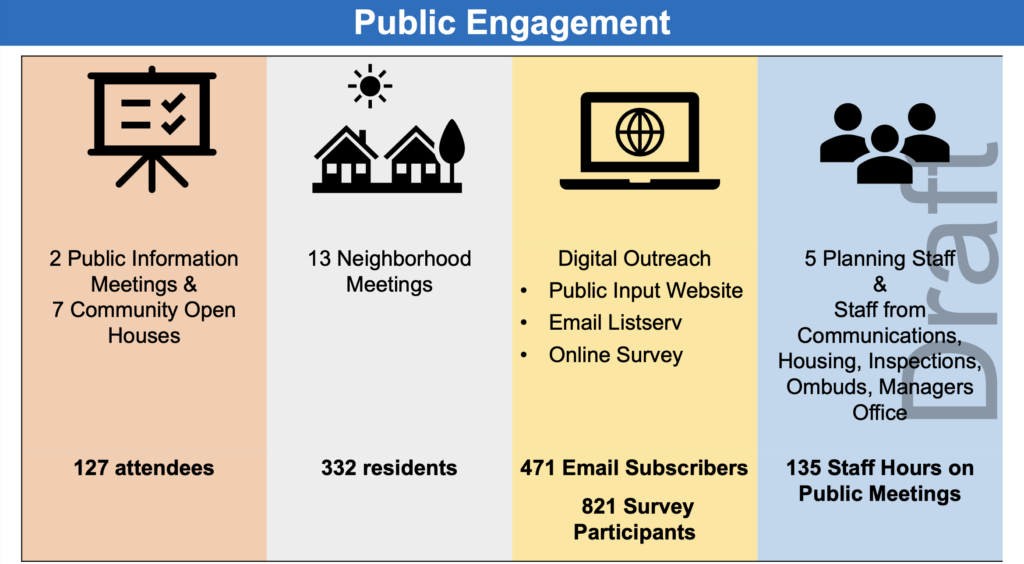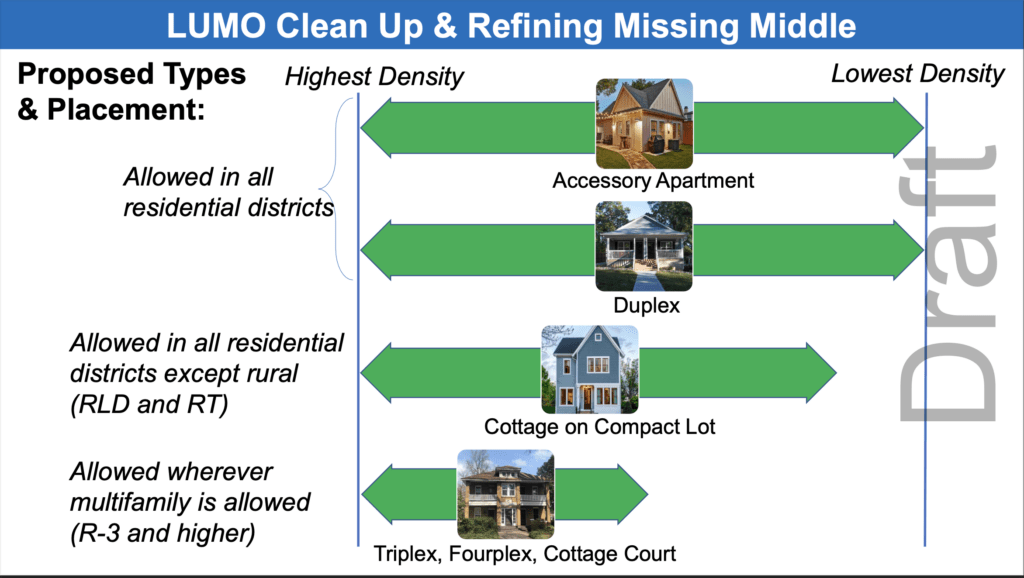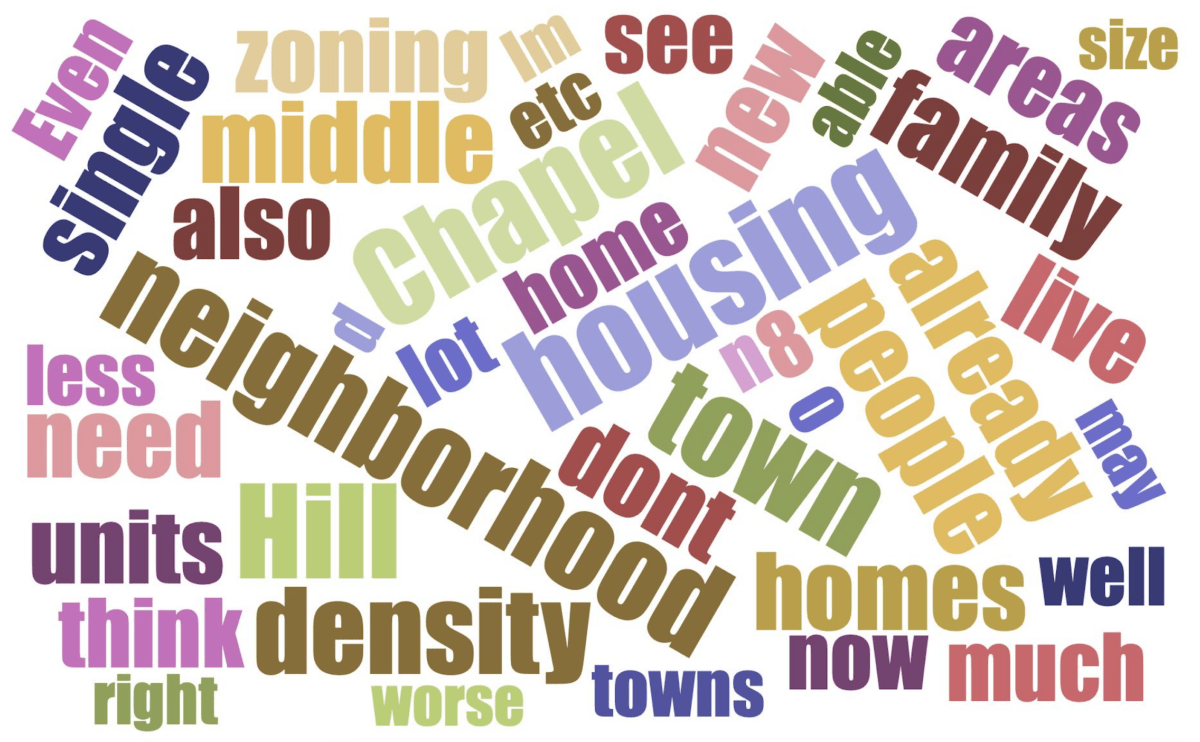Over the past few months, Chapel Hill homeowners from Gimghoul to Greenwood, Hidden Hills to Laurel Hill, Colony Woods to Lake Ellen, have taken precious hours out of their day to complain to, cajole, and sometimes just yell at town staff who, at the council’s direction, are trying to solve a major problem—we don’t have enough housing in Chapel Hill.
Back in September, a full year after four town council members petitioned staff to come up with new tools to address our housing shortage, Chapel Hill’s Planning Department put together a proposal to legalize Missing Middle Housing—quadplexes, triplexes, duplexes, cottage courts, and other housing types that are the Goldilocks of housing—not too big (apartment buildings), not too small (single-family homes).
In a better world, one would think that our community would be ecstatic to welcome more people and more housing diversity. College towns thrive because they attract creative, smart, passionate people from around the world, and accommodating more of them improves our economy, culture, and quality of life. Chapel Hill has never been a one size fits all community, but our lack of housing options has inadvertently turned us into a place where people come to rent an apartment for a few years, or live in an expensive single-family house forever.
On Monday, April 10, the Planning Department will return to council with an update on how the public—in actuality, older homeowners—responded to this plan, and a revised proposal that takes their feedback into account. In an 87-page summary of public input, obtained in scads of public input sessions and an online survey, opponents of more housing in Chapel Hill spoke loudly.

By design, the survey wasn’t representative of Chapel Hill’s demographics–almost 30 percent of respondents were over the age of 65, while just 11 percent of residents are that old—and there were so few respondents between 18 and 25 (a third of the town’s population) that they weren’t even mentioned. Similarly, people of color, who make a third of the town’s population, only constituted 12 percent of survey respondents, at best.
Not surprisingly, when asked what kinds of housing could be added in their neighborhood, 50 percent of respondents answered “none.” In public meetings, which can be viewed on the town’s YouTube channel, many Chapel Hill residents freely expressed their indifference to addressing the town’s housing needs, instead focusing on things that mattered to them, like traffic, parking, and traffic caused when people have trouble parking. (Hint: for their next petition, the council should ask town staff to explore eliminating parking minimums and charging market rates for street parking).

After taking input from the homeowner class, the town’s planning staff is recommending dialing back the proposal in several ways, including the following:
- Ta-ta triplexes, farewell fourplexes
While the rights of multi-millionaires to build 5,000 square foot homes with custom faucets and high-end gas ranges will remain unabridged, anyone who was hoping to rent or buy an apartment in a fourplex or triplex in much of town will have to look elsewhere.
The planning staff’s recommendation is to only permit the construction of triplexes and quads on land where people can also build apartments which is a:) not that much of Chapel Hill and b:) already full of triplexes, quads, and higher density apartments. We’re disappointed to see this change and wish the council would at least press for triplexes in R-2, which includes a lot of neighborhoods that are close to campus that already permit duplexes.
- Small houses are okay
The 87 pages of comments the planning staff received read like a collection of the world’s worst NextDoor posts, full of griping about unrelated matters, like the number of apartment buildings that are being built in Blue Hill, and specious complaints about students. (A sample: “I don’t want college students [to] live in my neighborhood. We have one home rented to students already and they drive over the speed limit, have lots of loud parties and are often publicly intoxicated. I don’t want anymore of that around my child.”)
But despite all of these comments, there wasn’t much discussion of one of the more interesting aspects of the proposal, changing the rules to allow for smaller homes and cottage courts. In the revised proposal, cottage courts, small houses built around a central courtyard, will be permitted, but they’ll have to be approved by the planning commission. But people will be able to build small houses on small lots (which they’re calling “Cottages on Compact Lots”) without going through the planning commission, which is a good change. Town staff is also proposing to allow churches and cultural institutions to add ADUs, which will make it easier for them to help meet the housing needs of our community.
Small houses are perfect for single people, couples, and small families who are seeking affordable housing in our neighborhoods. This is a welcome development, and we’re glad to see it in the revised proposal.
- Duplexes are okay too.
If you look at a zoning map of Chapel Hill you’ll immediately notice how much land we set aside for single-family-only neighborhoods. Under the revised proposal, people will be able to build duplexes in all neighborhoods, which is great news for anyone struggling to buy or rent a home in town. Zoning rules prohibiting duplexes discriminate against people who have lower incomes, and it’s good that the staff is proposing that our community puts an end to this practice.
This is a small, but important, step toward a more equitable community
Over the past few months, the vicious response to a moderate plan to add housing diversity in our neighborhoods has reminded all of us that the rules designed to exclude people of color, people with low incomes, and people in non-traditional households remain popular, at least among those who have benefited from these policies. Town residents who yelled at our public servants and questioned their professional expertise make our community look small-minded and mean-spirited.
While this revised proposal isn’t as ambitious as we would like, it represents an important step toward making our community a more inclusive place, one that’s willing to change as our population grows. Earlier this week, U.S. Senator Brian Schatz (Hawaii) gave an interview to Slate about his support for housing reform, including missing middle housing. He observed that it’s often liberal communities, like Chapel Hill, that are the most hostile to building new housing:
Others are just living in the contradiction that they are nominally liberal on all the things—climate and immigration and health care and LGBTQ rights and all the good stuff, but they also have a nice home and do not want other people to live next to them. And that is not a coherent political philosophy. That’s just a person thinking they’re liberal but they are not liberal about a basic question, which is: “Do I want a nurse or a firefighter or a sanitation worker or a restaurant worker or an elderly individual or a disabled individual or a student to live near me?” And if the answer is “Well, sure, but only if they can afford this 1-acre lot,” then you’re not that progressive.
On Monday, the council is going to pick up on our long conversation about what kind of community we want Chapel Hill to be. Do we want to be a “destination town,” a paradise for those who can afford it, and just a place to work for everyone else? Or do we want to be a community where people from all backgrounds can thrive, whether they live in a house, apartment, condo, or cottage? How we use land is the physical manifestation of our values. Let’s build a community for all.

